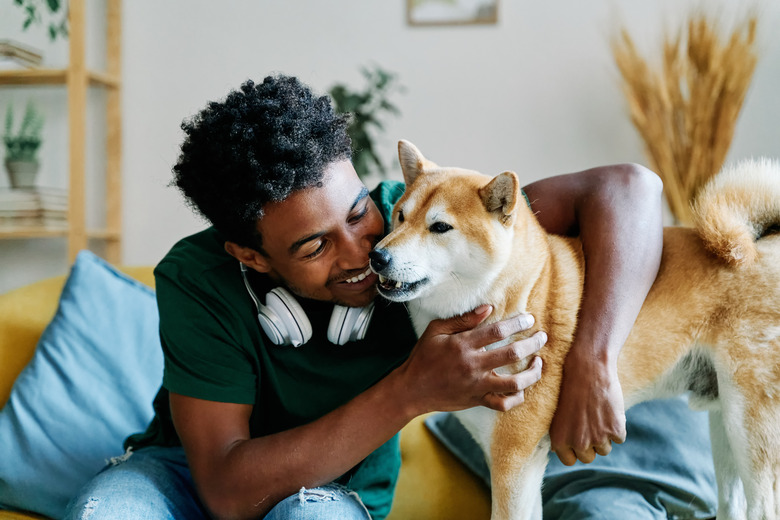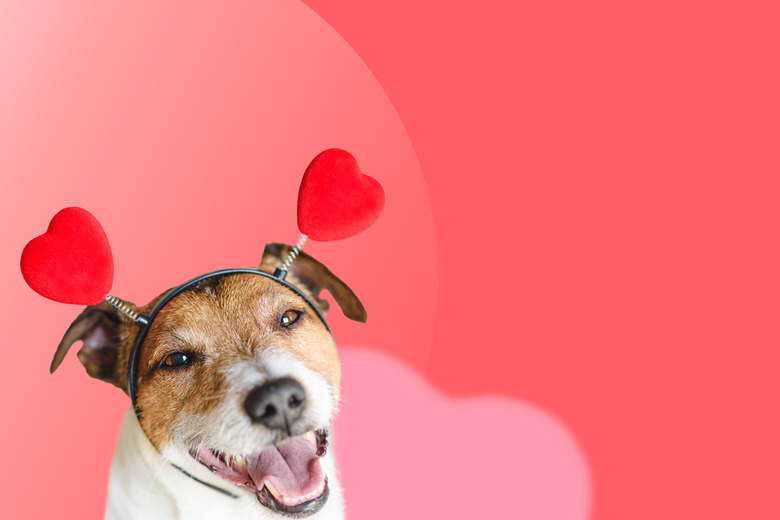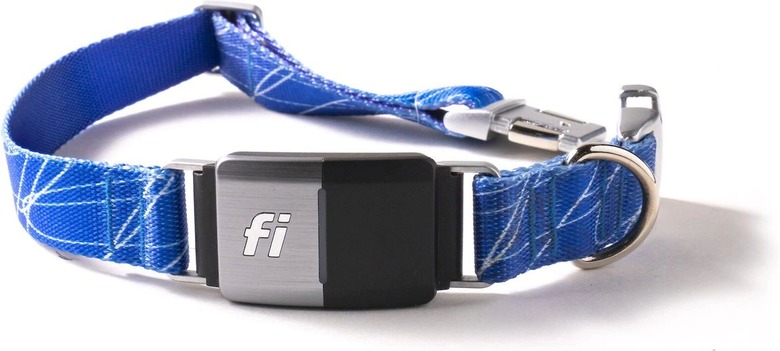A Dog's Heart Rate Goes Up When You Say "I Love You." Awww!
Ever talk to your dog? Chances are, you do, just like most of us pet parents. Most dogs know a handful of words and cues like "sit," "stay," and "come here," but do they really understand it when we talk about more abstract things, like how much we like them? As it turns out, there is one phrase that many of us say to our canine companions that get their heart rates up more than just about anything else.
Saying "I love you" to your dog
Saying "I love you" to your dog
According to a study conducted by Canine Cottages, a dog's heart rate goes up when their human counterpart says these words to them: I love you. In the study, researchers used heart rate monitors on four dogs and exposed them to a few scenarios to see what they got most excited about, causing their heart rates to increase. When the dogs saw their caregivers their heart rates went up an average of 10.4%, and when they were given cuddles by their pet parents, their heart rates went down an astonishing 22.7% (this is worth noting if you ever need to soothe or calm your dog down). When the dogs' guardians told them "I love you," their heart rates went aflutter and increased an impressive 46.2%.
So, according to this study, dogs get excited when they hear that special person say "I love you." As if they couldn't get more adorable. Now, we realize that this was only tested on four dogs! But the fact that they all responded in similar ways convinces us that other dogs will experience this too.
How to tell if your dog is happy
How to tell if your dog is happy
While the study only measured heart rate increases in three scenarios, it went on to list other ways that dogs show us that they're happy through their body language and behaviors. Dogs can display happiness, comfort, trust, and general contentedness through body language cues like licking or kissing, running up to greet you, and lying on their backs to expose their bellies. These are all behaviors that can also be seen in dog group dynamics, like dog pack settings. Some behaviors that happy dogs might engage in include obvious things like jumping up on you or snuggling near you, as well as protecting you from perceived danger, like a stranger reaching out to shake your hand, or someone approaching the door of your home.
Some behaviors we might consider strange or even annoying, but they can, in some cases, signal just how much our dogs love us. One example is digging out a personal item of ours and hiding it, or even destroying it, especially when that thing smells like us, like a shoe or a piece of clothing. Begging can also signify that your dog is requesting your attention. Even with the best intentions behind them, these behaviors can be problematic if they become habitual or chronic, so if your dog is acting out in troublesome ways, it's best to seek out training, implement enrichment activities, and make exercise a priority when you are home with them.
Measuring your dog's heart rate
Measuring your dog's heart rate
Are you curious to see if your dog's heart rate increases when you tell them you love them? You can do that with a smart dog collar, which can not only track your dog's whereabouts but their health as well. Smart collars do different things depending on the brand and the model, but some common features include GPS, geofencing, behavioral monitoring, and health monitoring, which can include measuring their heart rate. You can find a list of great smart dog collars here, which breaks down what each collar does, the cost, and other bits of info that might help you in your search for the right one.
One very important thing to keep in mind—a smart collar is not the same thing as an e-collar, which is sometimes known as a shock collar. An e-collar works by sending an electric shock to your dog's neck via a remote control. E-collars do not measure your dog's health or heart rate, and while we never recommend them for training, we definitely don't recommend them for this exercise as they just won't do what you need them to do at all.
When is a dog's heart rate normal?
When is a dog's heart rate normal?
The "normal" heart rate of a dog will depend on the size of the dog, and whether they have an existing heart condition. Small dogs and puppies usually have heart rates between 120 and 160 beats per minute. Dogs who weigh over 30 pounds have much slower heart rates—usually somewhere between 60 and 120 beats per minute. If you want to measure your dog's heart rate without a smart collar, you can count their number of heartbeats in 15 seconds, then multiply that number by 4.
What is a normal puppy heart rate?
What is a normal puppy heart rate?
Puppy heart rates usually measure between 120 and 160 beats per minute, and can get up to 220 beats per minute around two weeks old.
How can I calm my dog's heart rate?
How can I calm my dog's heart rate?
To lower your dog's heart rate, try doing things that you know relax and calm them down. If your dog is crate trained or has a bed or private corner of the home, try offering it to them along with some quiet time, or calming music. An anxiety vest may also soothe them, and if their heart rate is high due to high heat or other environmental stressors, offering them water and turning on a fan or air conditioning can also help. Additionally, you can try cuddling or gently petting your dog if they enjoy that, as the study found decreased heart rates when dogs were exposed to that. If your dog has a consistently high heart rate, consult your veterinarian as it may be a sign of a heart-related illness and may require medication.
What do smart collars do?
What do smart collars do?
Not all smart collars are the same, and each one will have different attributes to offer. Generally, smart collars are used to keep a dog safe. Many of them use GPS to do things like set virtual parameters and alert you when the dog has stepped outside of those boundaries. They can also measure basic health stats and activity levels, and some can even be used to help correct certain behaviors. Smart collars use WiFi to connect to an app, which you can use to adjust settings and notifications, and are often maintained through a subscription service.




